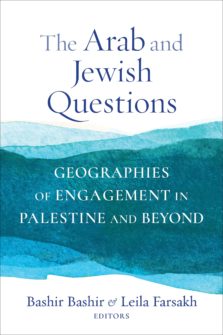Introduction
 The Arab and Jewish Questions: Geographies of Engagement in Palestine and Beyond draws links amongst otherwise segregated histories, struggles, and possibilities. It argues that three seemingly unrelated questions—”the question of Palestine,” “the Jewish question,” and “the Muslim question”—are conceptually and historically linked, and that their entanglement continues to fuel tensions in the Middle East, Europe, and the USA.
The Arab and Jewish Questions: Geographies of Engagement in Palestine and Beyond draws links amongst otherwise segregated histories, struggles, and possibilities. It argues that three seemingly unrelated questions—”the question of Palestine,” “the Jewish question,” and “the Muslim question”—are conceptually and historically linked, and that their entanglement continues to fuel tensions in the Middle East, Europe, and the USA.
The book is part of a wider research project that is motivated by the search for a new moral and political grammar for Israel/Palestine. This grammar is urgent if we are to move beyond the logics of partition, racial segregation, and settler-colonialism to achieve decolonization and historical reconciliation. The research project has three major components. The first component questions the paradigm of partition that has dominated international diplomacy around Israel/Palestine. The second examines links between the two foundational pasts of the Israeli and Palestinian narratives, namely the Holocaust and the Nakba. The third and final component casts a wider net and examines the entangled histories of the Arab, Muslim, and Jewish questions. To date, the project has resulted in three main publications: Rethinking the Politics of Israel/Palestine: Partition and its Alternatives, The Holocaust and the Nakba: A New Grammar of Trauma and History, and now The Arab and Jewish Questions.
These three books are in close conversation with each other by interrogating two main features confounding political modernity. The first is the nation-state’s drive for homogeneity and the second is settler-colonialism’s drive for eliminating the natives and streamlining settlers’ racialized normativity. These features have channeled European/western efforts to (re)draw lines of enmity along racialized hierarchies of identities and instituted dynamic strategies of ruling and exterminating others. Problematizing the workings of these features, therefore, is critical for understanding the ubiquitous intersections of European nationalism and imperialism, Zionism, and Arab nationalism and their contemporary guises and vehicles of reproduction.
In the last two decades, the discourse of Islamophobia has been indispensable to the articulation and reproduction of modernity’s political fixes and has also masked the intimate ways that it is bound to western antisemitism and Orientalism. The resurgence of the discourse of antisemitism testifies to this twisted logic. Instead of attending to this phenomenon as a reminder of the troubling endurance of the Jewish question and its underlying political generators in the west, the discourse of countering antisemitism is (ab)used to shoulder blame on “Islam” and stigmatize and racialize abstract “Muslims.” Being Muslims and Arabs, Palestinians are asked to pay the antisemitic bill of an allegedly a philosemitic west: the victims of the victims are the perpetrators! Once more western modernity’s ordeal then centers around the “Jewish question,” “the Muslim question,” and “the question of Palestine.”
‘The question of Palestine,’ ‘the Jewish question,’ and ‘the Muslim question’ are conceptually and historically linked, and their entanglement continues to fuel tensions in the Middle East, Europe, and the USA.
In the following, I introduce each one of the three components of research and the way they grapple with the enduring effects of modernity’s political fixes. Then, I elaborate on the link between the three research components and prescribe egalitarian binationalism as a principle which cuts against the grain of modernity’s hegemonic logic in Palestine/Israel. Put differently, I contend that in Palestine/Israel’s case, egalitarian binationalism is a guiding ethical principle for a form of politics that can unsettle the reigning chauvinist and racialist tendencies of the nation-state model and the settler-colonial mindset.
Terms of the Debate
(1) Alternatives to Partition. There are increasing challenges to the long-held idea that the creation of two separate nation-states will resolve the conflict between Zionism and Palestinian nationalism. In response, many have proposed integrative solutions to the traditional two-state paradigm. Integrative solutions refer to inclusive and egalitarian political visions and institutional arrangements for all the citizens and residents of Palestine/Israel. In Rethinking the Politics of Israel/Palestine, I, with my coauthors, map out and critically assess the strengths and weaknesses of these integrative solutions to Palestine/Israel. The book was the product of a research group that worked closely for several years at the Bruno Kreisky Forum for International Dialogue in Vienna. In my contributions there, I argued that Palestinian nationalism is undergoing a process of redefinition whereby the whole of Mandate Palestine is viewed as a single political unit of analysis and the Palestinian “we” and struggle for freedom encompasses all Palestinians.
(2) The Holocaust and the Nakba. In several articles co-authored with Amos Goldberg, I developed a theoretical framework for shared and inclusive deliberations on the memories of the Holocaust and the Nakba. While these two foundational tragedies are often discussed separately and in abstraction from the constitutive historical global contexts of nationalism and colonialism, we explored the historical, political, and cultural intersections between them. Without blurring the fundamental differences between the two, we examined how and why the Holocaust and the Nakba were embedded in cultural imaginations, colonial and asymmetrical realties, and how articulating these links can pave the way for a new political and moral grammar. This new grammar, we claimed, enables a joint Palestinian-Israeli dwelling and supports historical reconciliation in Israel/Palestine. Our co-written articles were published in the Journal of Genocide Research and in two volumes that we co-edited. The first was entitled The Holocaust and the Nakba: Memory, National Identity and Jewish-Arab Partnership (2015, in Hebrew) and the second is a major collection of essays published by Columbia University Press as The Holocaust and the Nakba: A New Grammar of Trauma and History (2018).
(3) The Arab and Jewish Questions. In Rethinking the Politics of Israel/Palestine and The Holocaust and the Nakba: A New Grammar of Trauma and History, I argued that a better understanding of the question of Palestine/Israel requires revisiting “the Jewish question” and the ways Europe’s colonial history and nationalism created the question of Palestine and its intersections with the pressing historical and contemporary issues in Europe, the Middle East, and elsewhere in the world. As a result, I launched a third research project at the Bruno Kreisky Forum under the title “Jewish Engagements with the Arab Question and Arab Engagements with the Jewish Question.” The project was premised on the claim that over the past two decades Middle Eastern and European politics have been impacted by three critical developments that call into question dominant understandings of nationalism, citizenship, and decolonization.
First, “the question of Palestine” remains unanswered. The aggressive and ongoing colonization of Palestine has created irreversible realities that cast serious doubts on the feasibility of partition and the “two-state solution.” At the same time, Palestine’s colonization deepened the entanglements between Israeli and Palestinian lives, rendering inseparable the question of present and future rights of Palestinians and Israelis. Second, the Arab uprisings that erupted in a number of Middle Eastern and North African countries in 2011 signaled the demise of grand assimilationist ideologies like Arabism, Ba’athism, and Islamism, thereby calling into question the overarching “we” that cements the citizenry together. Third, Islam and Muslims have become the new internal signifiers of otherness, particularly in the west, which poses serious challenges to existing conceptions of citizenship and democracy there. The rise of chauvinist and Islamophobic notions of citizenship reflect, among other things, an intimate conceptual and historical link between Judeophobia and Islamophobia in Europe.

Many scholars have studied the causes underlying these developments. No study, however, has explored the intersections between the rise of Islamophobia in the west, the failure to resolve the Arab-Israeli conflict, and the political meanings of the Arab uprisings. Neither have many scholars examined how these developments are tied to three seemingly unrelated questions, namely the question of Israel/Palestine, the Arab-Muslim question, and the Jewish question. Starting in 2012, we held a series of international workshops to critically examine these intertwined topics. One of the outcomes of these workshops is the previously mentioned volume The Arab and Jewish Questions. This book argues that these questions are not only entangled, but also belong to the same history—one that continues to foment tensions in the Middle East, Europe, and the U.S. By shedding new light on the intricate relationships among Orientalism, antisemitism, Islamophobia, colonialism, and the impasse in Israel/Palestine, the book reveals the inseparability of Palestinian and Israeli struggles for self-determination and eventually for political equality.
These three research projects do not only interrogate how nationalism and settler colonialism shaped Europe and the Middle East, they also pave the way for identifying egalitarian binationalism as an ethical frame for decolonization, historical reconciliation, and the dismantling of Jewish Israeli supremacy in Israel/Palestine.
Egalitarian Binationalism
Egalitarian binationalism is a principle that recognizes and promotes the existence of two national groups with equal rights to self-determination. Egalitarian binationalism represents a bold departure from what has dominated the literature on Israel/Palestine. For decades, scholars have proposed various frames to conceptualize Israeli politics and citizenship regimes, like Jewish and democratic (e.g., Ruth Gavison; Alexander Yakobson and Amnon Rubinstein), ethnic democracy (e.g., Sammy Smooha), ethnocracy (e.g., As’ad Ghanem and Oren Yiftachael), multiculturalism (e.g.,Yehouda Shenhav and Yossi Yona), indigeneity (e.g., Amal Jamal), and egalitarian Zionism (e.g., Chaim Gans). Despite their differences and disagreements, these frames share two problematic assumptions. First, they presuppose a relationship of majority (Israeli Jewish) and minority (Palestinian) in Israel. Second, they operate within the logic of partition under which the State of Israel is confined within the boundaries of 1967. Egalitarian binationalism disputes both of these assumptions and insists on viewing the entire land between the Mediterranean Sea and Jordan River as one political unit of analysis belonging to a larger region, the Eastern Mediterranean. Furthermore, it views the aspired relationships between the Israeli Jews and Palestinian Arabs as premised on national parity rather than on majority/minority relationships. Stated differently, egalitarian binationalism recognizes the right to national self-determination of both national groups while insisting that this right ought to not be realized in the form of an exclusive ethnic state.
Recently, it has also become common to use settler colonialism as a desirable interpretive frame to engage with Israel/Palestine and go beyond partition and peacemaking discourse. According to this “colonial turn,” settler colonialism is the core dynamic that shapes the conflict and not peacemaking of nominal symmetry. While settler colonialism draws attention to several overlooked issues (power asymmetry, the centrality of land, and political elimination), egalitarian binationalism argues that it fails to capture the national dimension of Israeli Jewish identity and remains underdetermined regarding what would be the ultimate outcome of decolonization. The overwhelming majority of one-state advocates are suspicious of a prescriptive bi-national paradigm that would afford the two national groups equal collective rights, primarily because its recognition of Israeli-Jewish national self-determination is seen as entrenching, rather than decolonizing, colonial relations of power. I argue that an egalitarian binationalism in fact offers rich resources for a decolonizing project in Israel/Palestine that seeks to establish a polity based on the principles of justice and equality, coming to terms with historical injustices, and imagining alternative pasts, presents, and futures based on Palestinian-Israeli relationships. In this way, egalitarian binationalism is better equipped to address the persistent and underlying issues of the conflict and its colonial realities. The national entry within the frame of binationalism is very critical for Palestinians because of its emancipatory potential. Articulating the Palestinian struggle in national terms has a liberating power given the centrality of denial, negation, and misrecognition that informed the development of Palestinian nationalism, whether from Zionism, Arab regimes, or western powers. Therefore, it is the language of national identity and not post-national identity (in its liberal variant or in others) that grants Palestinians confirmation and recognition of their peoplehood. Thus, the binational frame that takes seriously the existing realities of intertwinements secures the recognition of this constitutive dimension of Palestinian identity.
Egalitarian binationalism recognizes the right to national self-determination of both national groups while insisting that this right ought to not be realized in the form of an exclusive ethnic state.
The national entry within the proposed egalitarian binationalism reasonably addresses two main historical arguments, though contested and controversial, in support of Jewish nationalism too. Based on the traumatic and long history of antisemitism and Jewish persecution, the first argument maintains that Jews need a shelter run by Jews and with Jewish veto power. The egalitarian binationalism that I propose here affords ample protection and representation for Jews. The second prevailing argument is that Jews are entitled to national self-determination, like other nations, preferably, in the Holy Land where they have religious and historical attachments. In light of intertwined realities and theological attachments to the entire land of Israel/Palestine, the proposed egalitarian binationalism insists that these aspirations for self-determination and normalization are better met by binational arrangements than by the two-state or one (liberal)-state solutions.
Unlike other fashionable theoretical frames that are “imported” (liberalism, multiculturalism, indigeneity etc.) to explain realities or envision futures in Israel/Palestine, the egalitarian binationalism that I propose is based on and inspired by the concrete and existing realities in Israel/Palestine where the life and future of Jews and Palestinians are intertwined. It starts from the local conditions in order to conceptualize the solution for Israel/Palestine and then moves to global claims and comparisons.


Basically- in one word- anti-Zionism. Just said more delicately.